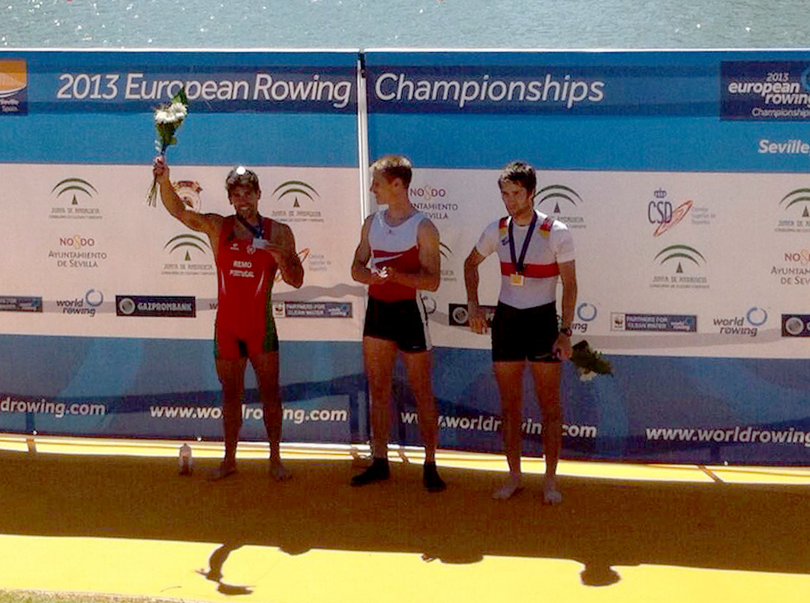iSchool professor coaches Finland, Portugal’s rowing teams
Syracuse University professor Michael D’Eredita established the first varsity sport in Finland. While coaching overseas in Turku, Finland in 2000, he and a team created University Rowing. Previously, sports were available through clubs and were not university-sponsored. He went on to coach Finland’s national rowing team, bringing them back-to-back scholars in the World Rowing Cup and the 2000 World Championship title. He was also responsible for two rowers winning the World Rowing Cup lightweight women’s single and lightweight men’s single scull event for Finland.
Fifteen years later, the iSchool professor is still coaching, now as the high performance director for Portugal’s national rowing team.He’s led both the Finland and Portugal teams to Rowing World Cup medals. As the high performance director, D’Eredita is in charge of creating a system including a team of coaches, athletes and a training program.
D’Eredita’s passion for rowing began when he was on the rowing team in high school in Liverpool, New York.
“I purposefully took to rowing for two reasons — one person told me that it was the hardest sport so I took it as a challenge,” D’Eredita said. “The other reason I chose it was that I always viewed it as a lifelong sport.”
When he was in graduate school studying cognitive/experimental psychology at Syracuse University, he was the graduate assistant for the university’s rowing team. He went on to coach U.S. developmental and U.S. pre-elite teams, before traveling to Finland in 2000. Around the same time, he took a job teaching at SU.
Despite the travel required for him to coach, D’Eredita’s work overseas doesn’t interfere with his teaching profession. The professor has chosen to live in the United States in order to keep teaching at SU.
Marcene Sonneborn, an iSchool professor who teaches classes on information technology startups with D’Eredita, said D’Eredita’s traveling has never been a problem for the two of them. Sonneborn added that they work collaboratively to plan out the semester.
Sonneborn, who has worked with D’Eredita for about six years, added D’Eredita’s passion for rowing is evident.
“When he talks about rowing, that is his true love and it’s just something that he gets a lot personally from it, and he is always very animated when he talks about it,” Sonneborn said. “When he talks about the individuals he’s coaching, it’s almost like a father coaching a son,” Sonneborn said.
It was this passion for coaching that led D’Eredita from a winning Finland to a less-talented Portugal in 2003. The national team was performing very poorly, and needed to win medals in an Olympic event at the Senior or Under 23 World Championships by 2004. If Portugal didn’t, its Olympic Committee was going to deem rowing as a recreational sport and stop funding the team.
When D’Eredita arrived to coach, one of Portugal’s best athletes, named Luis Teixeira, was ready to quit. But after one week at training camp with D’Eredita, the athlete had a change of heart. With D’Eredita as the new coach, Portugal won two bronze medals at two World Cup events and won the silver medal at the Under 23 Championships that the team needed in 2004.
Adrian Hatch, a junior information management and technology major, said D’Eredita’s success as a coach shows in his teaching of entrepreneurship. He said D’Eredita knows how to build and run a team, and teach someone else to do the same.
“You can tell he has a passion. He made the point that you don’t have to be a rower to teach these guys, because you can be passionate about rowing,” said Hatch, who has taken several classes with D’Eredita. “But all the guys on the team are great at rowing. They are as good as it’s going to get.”
When a new administration took over the Portugal Rowing Federation in 2004, D’Eredita got replaced by a new coach. But when the state of rowing dropped during the new administration, Teixeira, who trained with D’Eredita, started his own international training center and four-star hotel. In 2011, Teixeira decided to run for president of the rowing federation. He asked D’Eredita to come back to Portugal to “clean up the mess” made by the new administration.
Teixeira is now the president of the Portugal Rowing Federation, a position he’s held since 2012. He was the one who asked D’Eredita to come back to Portugal as high performance director.
“I’m addicted to building something from nothing. While there wasn’t ‘nothing’ there, in terms of international results and a system, there wasn’t a system. So that’s the fun part,” D’Eredita said. “It’s building a system that hopefully will continue to turn out results in the long run.”
D’Eredita believes failure is a great thing, however. It teaches athletes that the gold medals are earned and don’t just happen because of luck.
“The woman I used to coach, Laila Finska, used to say that you have to learn how to lose before you win and she’s right,” D’Eredita said. “What is really meant by that is, to really lose means you are going into an event thinking and believing you are going to win. That’s when you really lose.”
Published on February 5, 2015 at 12:57 am
Contact: maquigle@syr.edu









